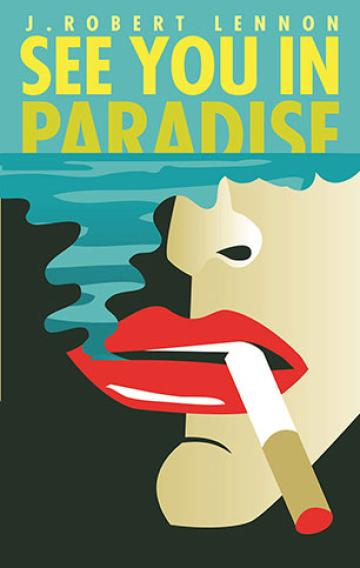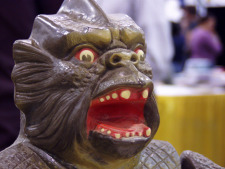SEE YOU IN PARADISE: Stories by J. Robert Lennon
The first story you encounter in See You in Paradise, J. Robert Lennon's electric book of short stories is "Portal." As easy as it seems to dismiss the idea behind the story--a family of four discovers a literal portal in their backyard that takes them to alternate universes--it's impossible ignore and even more difficult to shake once you've emerged on the other side of it. Lennon drops pieces of the alternate universes into casual narrative conversation as if he were describing weather conditions or a interesting news story he overheard at work:
"the second time we went through, we thought we were in old-time England, on some heath or something...the third time we went through we ended up in this crazy city...guys selling stuff, people zipping around in hovercars, drunks staggering in the streets, cats and dogs and these weirdly intelligent looking animals that were sort of like deer but striped and half as large."
Ultimately, the family ends up crossing over into hell, albeit briefly, and emerges mentally scathed. The world has become more unsettling as we march indiscriminately toward the end: "crowds of people with no faces, a world where the ground itself seemed to be alive, heaving and sweating." See you in paradise, indeed.Lennon's paradise is, of course, our very own. The world--our world--that he painfully recreates and stakes out in each story is some version of our perceived paradise; a place where everything feels, smells, and tastes too good to be true.
Often, it is too good to be true, as in the titular story that places an unsuspecting victim on a tropical island, but it's exactly as good and true as it seems. The only conflict is our unwillingness to accept what's around us at any moment without constantly feeling as if the rug will be pulled out from under us. It's existential dread at its utmost and real.
But that's how it goes with the human condition. We live in an incredible, unimaginable world where science routinely facilitates miracles, weather patterns emerge in all their destructive glory for us to witness, and happiness resides in a single embrace from a loved one or a distant voice on the phone. And yet, our misery makes us complacent and terrified of what we behold once we open our eyes.
Misery takes many forms in See You In Paradise, whether it's the single listed form of "The Accursed Items" (e.g., "The houseplant that will not die"), the self-imposed distance between family members in "Portal" and "The Future Journal," or the physical time capsule a family discovers on their last vacation together at Lake Craig, New York, in "Total Humiliation in 1987." Forget men leading lives of quiet desperation as Thoreau once told us; in modernity the mass of men and women lead lives of quiet ineptitude.
This wide-ranging collection that spans much of Lennon's brilliant career is most potent when it addresses our denial of death. The book begins with a family seeking a new way to feel alive via a discovered portal in their backyard and ends with a story where someone's mother holds a party where the main attraction is the family dog being euthanized. If See You In Paradise weren't shot through with gallows humor and utter realism at every turn, it would be far too much to take. Partly because it's difficult to believe in the actions Lennon's characters choose, and partly because their actions seem all too familiar.
The two crucial stories that stick like a knife in the back are "Zombie Dan" and "The Wraith"; both stories that tackle a figurative death and a literal resurrection. "Zombie Dan" resurrects in title character from the dead once science discovers a way to enact "revivification" on certain deceased individuals. "You were never, in any circumstances, supposed to call them zombies," our narrator tells us. "This was, however, the most commonly employed term." As Dan, our zombie guide, is revivified, his strange behavior begins to affect all those around him, including his own mother who paid for his revivification and then hires his pseudo-friends to kill Zombie Dan again. Zombie Dan's only crime, besides a little twitchiness and some slurred speech patterns, is that all of the truths he buried pre-revivification come flooding back and spew from his mouth with wild abandon. As it turns out, the truth makes a lot of folks uncomfortable, especially when it's best kept in the grave.
"The Wraith" inverts this resurrection theme slightly. In a hilarious and biting political commentary, a wife is driven to depression and suicide by the presidency of George W. Bush. ("Abu Ghraib made her vomit, and when Kerry lost, she burned her own hand on the stove top on purpose.") But, as it turns out, she doesn't quite die; she kills one half of her spirit. The other half wanders the house as a mud-colored wraith while she cheerfully goes off to work every morning. Eventually the wraith goes in search of carnal knowledge and the character's actions become stranger and more gruesome. Until we're released, blessedly, from the story's maniacal grip.Every finished story in See You In Paradise is akin to a little release, a little death, for the reader.
As one story ends, you're never quite sure you have the strength or the mental fortitude to carry on to the next one. But Lennon's icy humor, a mixture of George Saunders, Kurt Vonnegut, and John Updike, is charged with potential energy. It never fades and the momentum runs restlessly from point to point. It's painful to witness at times--this human folly that he so accurately captures--but it's the type of pain that reminds us of the blood running under our skin. The type of pain that, once you've experienced it, you'll pay any price to feel it once more.
J. Robert Lennon is the author of seven novels, including Familiar, Castle, and Mailman, and a story collection, Pieces for the Left Hand. His fiction has appeared in the Paris Review, Granta, Harper's, Playboy, and the New Yorker. He lives in Ithaca, New York, where he teaches writing at Cornell University.

 Scott D. Elingburg is software analyst and freelance writer. His work has appeared in the South Carolina Review, the Southeast Review, Wide Awake Press Anthologies, MetroBeat (formerly Creative Loafing), Charleston Style and Design, and several other publications. Currently he is the reviews editor and regular contributor at the pop culture website, Stereo Subversion and frequent contributor to PopMatters. He's not much of a fisherman, but he does live in Charleston, SC with his wife, daughter, and cat.
Scott D. Elingburg is software analyst and freelance writer. His work has appeared in the South Carolina Review, the Southeast Review, Wide Awake Press Anthologies, MetroBeat (formerly Creative Loafing), Charleston Style and Design, and several other publications. Currently he is the reviews editor and regular contributor at the pop culture website, Stereo Subversion and frequent contributor to PopMatters. He's not much of a fisherman, but he does live in Charleston, SC with his wife, daughter, and cat.